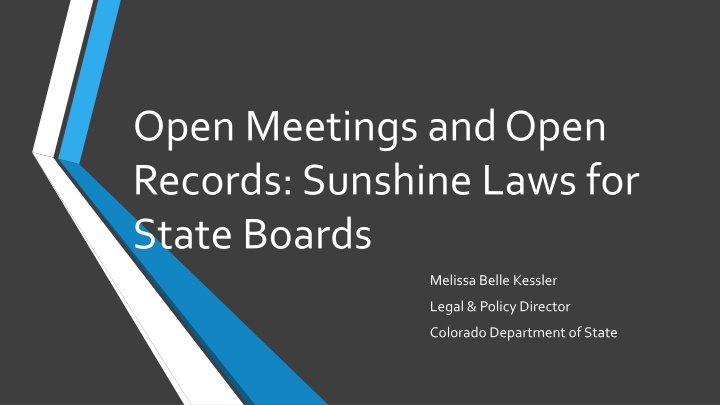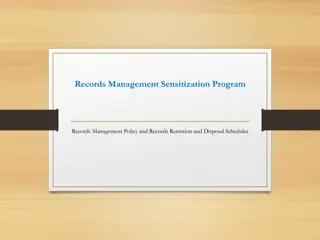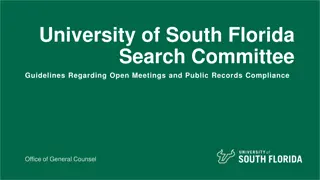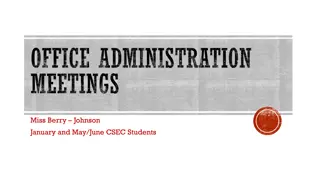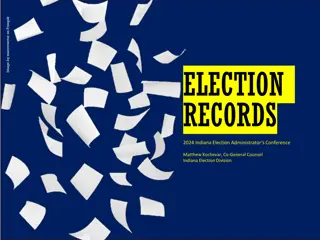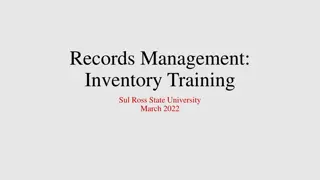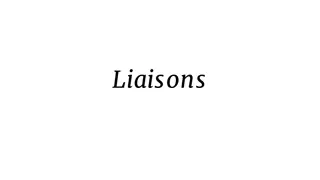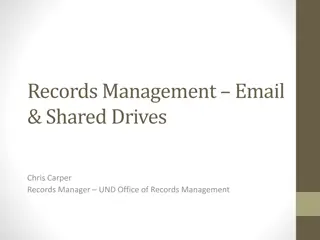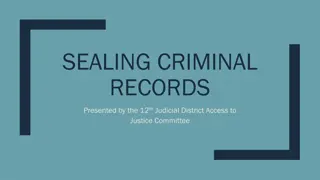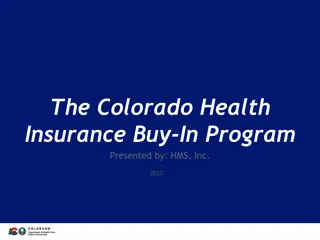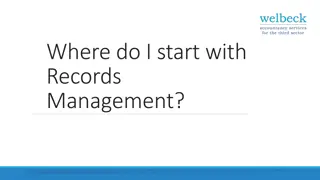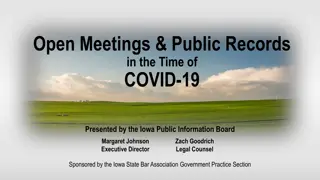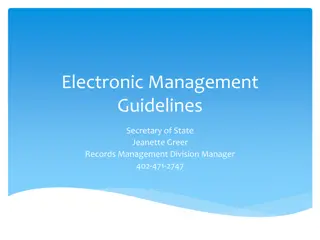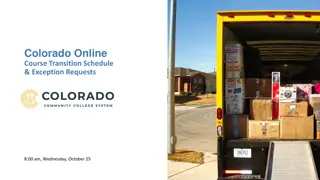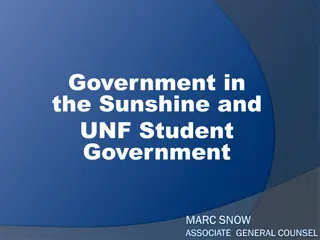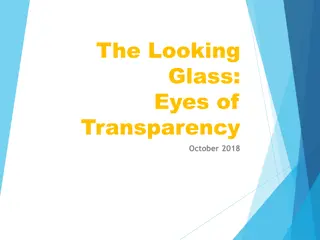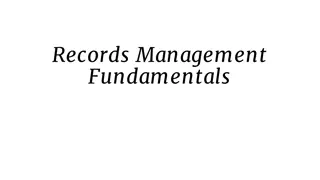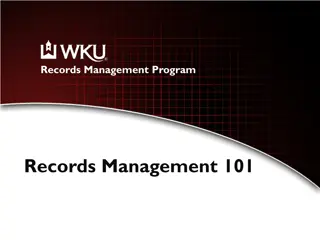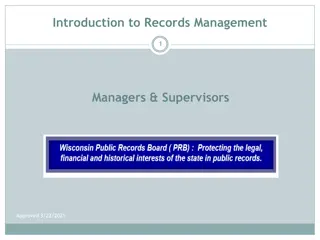Colorado's Open Meetings and Open Records Laws
Explore the regulations of Colorado's Open Meetings Law (OML) and Open Records Act, ensuring public transparency in state board activities. Learn about public meeting definitions, executive session constraints, and best practices to comply with OML requirements.
Download Presentation

Please find below an Image/Link to download the presentation.
The content on the website is provided AS IS for your information and personal use only. It may not be sold, licensed, or shared on other websites without obtaining consent from the author.If you encounter any issues during the download, it is possible that the publisher has removed the file from their server.
You are allowed to download the files provided on this website for personal or commercial use, subject to the condition that they are used lawfully. All files are the property of their respective owners.
The content on the website is provided AS IS for your information and personal use only. It may not be sold, licensed, or shared on other websites without obtaining consent from the author.
E N D
Presentation Transcript
Open Meetings and Open Records: Sunshine Laws for State Boards Melissa Belle Kessler Legal & Policy Director Colorado Department of State
Agenda Opening Meetings: Colorado s Open Meetings Law Open Records: Colorado s Open Records Act
Colorados Open Meetings Law (OML) Formation of public policy happens in the public eye, not in secret. Public meetings Carefully limited executive sessions
Public Meetings Meeting is defined as any kind of gathering, convened to discuss public business, in person, by telephone, electronically, or by other means of communication. C.R.S. 24-6-402(1)(b). All meetings of two or more members of any state public body at which any public business is discussed or at which any formal action may be taken are declared to be public meetings open to the public at all times. C.R.S. 24-6-402(2)(a). What makes a meeting open to the public ? Notice to public, with agenda Strict limitations on closed sessions Minutes must be taken
Public Meetings CAUTION: Emailsbetween two Board members or telephone conversationsbetween two Board members about board matters constitute meetings, and if so, can be subject to the requirement of open access. CAUTION: A meeting is not limited to just regularly scheduled meetings of the Board. EXCEPTION: Social gathering or chance meeting in which board matters are not discussedis not considered a meeting. See C.R.S. 24-6-402(2)(e).
Executive Sessions Substantive Constraints Procedural Constraints Two-thirds vote of entire body required Must record session Recording must be retained by the Board for at least 90 days after the date of the executive session. Must announce basis and topic for session in as much detail as possible without compromising the purpose of the session May not deviate from the announced topic If more than one topic is going to be discussed, identify the order in which each topic will be discussed. Available only for limited subject matters Conferences with board attorney to discuss pending or imminent court actions involving the Board. Conferences to receive legal advice on a legal or procedural question. Matters that are required to be kept confidential under federal or state law. No formal action allowed A final vote or decision must be conducted in open session.
OML Best Practices Refrain from emailing other board members. Emails to board should be sent by staff. Staff should BCC board members in group emails to reduce the chance of a Reply All discussion. Any discussion over email about a board meeting or board matters should be with staff. Work closely with board counsel to prepare motions to enter executive session to ensure the requirements of OML are met.
Consequences of OML violation Invalidation Willful Misconduct Negative Publicity Litigation/Attorney Fees Release of Confidential Information
Colorados Open Records Act (CORA) CORA [a]ssure[s] that the workings of government are not unduly shielded from the public eye. Presumption is that public records are open to the public.
Public Records Public records includes any writing made, maintained, or kept by the state or any agency. C.R.S. 24-72-202(6). Board records are public records. Board business emails to/from a personal account Personal emails to/from a personal account Board business emails that include a public employee Board business emails that don t include a public employee Board emails to board counsel seeking legal advice PUBLIC RECORD PUBLIC RECORD PRIVATE PRIVATE PUBLIC RECORD PUBLIC RECORD PUBLIC RECORD PUBLIC RECORD PRIVILEGED PRIVILEGED
CORA Best Practices Treat all emails as if they will be published in The Denver Post tomorrow with no favorable context. Forward any CORA requests to Board admin or counsel. If staff or counsel asks whether Board members have any responsive documents, please respond promptly given the short statutory deadlines under CORA. Do not assume an email or other document in your possession is not a public record. Seek guidance from counsel. Make sure Board counsel communications are handled confidentially.
Consequences of CORA violations Negative Publicity Litigation/Attorney Fees
Overview of Senate Bill 22-034 Presented by John Magnino, Director of Government and Public Affairs Colorado Secretary of State s Office Wednesday, August 31st, 2022
Senate Bill 22-034 Business Filing Address and Name Fraud Sponsored by Sen. Chris Kolker, Sen. Kevin Priola, Rep. Shannon Bird, Rep. Shane Sandridge Problem: Rising incidents of fraudulent business filings reported to SOS, Attorney General, and CBI No pathway to correct records in Secretary of State s Business Registry SOS office not empowered in law to take action regarding fraudulent records Solution: Pass legislation to empower the SOS Office and Attorney General s Office to work together to remedy fraudulent records in SOS Business Registry Bipartisan legislation, passed unanimously through both chambers Signed into law by Governor on 06/02/22; effective February 2023
Interagency Process Complaint process housed on SOS website SOS reviews complaints for completeness, then sends to AG, CBI AG sends two separate demand letters (separated by 21 days) via mail to agent on business record asking for information / documentation of relationship of agent to the business entity If two mailings receive no response from agent, complaint is deemed conceded by AG, AG provides certification to the SOS Two courses of action for SOS depending on type of fraud: Type 1 Illegitimate entity, CO address used to form business in the registry Remedy: redact names and addresses used without authorization; marking business record s summary page as fraudulent; disabled filing functionality ( freezes out the fraudster) Type 2 Legitimate business hijacked by fraudster Remedy: flag relevant individual filings as fraudulent; redact names and addresses used without authorization; marking on summary page noting entity was victim of fraud
Interagency Process Complaint returned to sender w/ ask for more information Attorney General reviews complaint and determines that it should be investigated SOS Office reviews to ensure complaint is complete and alleges improper use of name or address for business filing SOS Office receives complaint of fraud Complaint referred to AG for investigation YES Attorney General sends two separate notice and demand letters to entity asking for information / documentation of relationship between registered agent & business No response to both demand letters Allegations in complaint deemed conceded; AG provides certification to SOS Office SOS Office remedies the fraudulent record in the Business Registry Recipient responds to demand letter AG may refer to Administrative Law Judge for hearing
Working Group THE WORKING GROUP TO STUDY MEASURES TO COUNTERACT FRAUDULENT FILINGS IN THE ONLINE BUSINESS FILING SYSTEM IS HEREBY CREATED TO STUDY POTENTIAL MEASURES TO COUNTERACT AND PREVENT FRAUDULENT FILINGS IN THE ONLINE BUSINESS FILING SYSTEM THE WORKING GROUP SHALL SUBMIT A REPORT TO THE GENERAL ASSEMBLY BY JANUARY 31, 2023, CONTAINING POTENTIAL LEGISLATIVE PROVISIONS TO COUNTERACT AND PREVENT FRAUDULENT FILINGS, AS WELL AS THE COSTS AND BENEFITS ASSOCIATED WITH EACH POTENTIAL LEGISLATIVE PROVISION. THE REPORT MAY INCLUDE SPECIFIC RECOMMENDATIONS TO THE GENERAL ASSEMBLY.
Updates Presented by Mike Hardin
Public comment If you are attending this meeting in person, you should have indicated on the sign-up sheet whether or not you wished to provide commentary. We will reference that sign-up sheet and individually call upon participants who wish provide to their public comment. For the sake of efficiency, those who are attending this meeting in person will be called upon first to provide their public comment. We will move forward with the commentary of online participants once we have exhausted the sign-up sheet.
Public, online comment We will call upon online attendees to use the raise hand tool to indicate that they wish to speak. For all online speakers, we will announce your name and state when you are unmuted. When you finish, we will mute you again and move down the list.
Public, online comment In progress: Online testimony from individuals who indicated that they planned to testify when they registered for this webinar hearing.
Housekeeping information Our office has published the information needed for the Fraudulent Business Filings Work Group on the SOS website: https://www.coloradosos.gov/pubs/business/fraudFilingsGroup.html Please email public comments to PublicCommentsSB22034@coloradosos.gov
